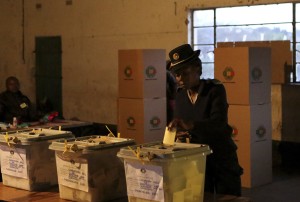Perhaps predictably, President Robert Mugabe has been declared the winner of Zimbabwe’s general election but equally predictably, Movement for Democratic Change leader Morgan Tsvangirai has rejected the outcome out of hand.
Cryptically, Mr Tsvangirai told anyone that would listen that there is evidence available that shows his party actually won the election. Petulantly, Mr Tsvangirai has declared his MDC will not legitimise government institutions resulting from the election and will take no part in them. Inevitably, he said the MDC will exhaust all legal remedies to challenge the election result.
Earlier, a Zimbabwean election commissioner resigned, citing doubts about the integrity of results showing a big win for President Mugabe’s ZANU-PF party but dismissed as a fraud-riddled farce by Mr Tsvangirai. Mkhululi Nyathi said he quit the nine-member Zimbabwe Electoral Commission (ZEC) over the way it managed the presidential and parliamentary vote held last Wednesday. His resignation is likely to add to the dispute over the election both inside and outside Zimbabwe.
“While throughout the whole process I retained some measure of hope that the integrity of the whole process could be salvaged along the way, this was not to be,” Mr Nyathi said in a resignation letter.
Mr Tsvangirai’s MDC has said it could take to the streets to challenge ZANU-PF’s claim of a landslide victory, made less than 24 hours after the polls had closed on Wednesday. ZANU-PF’s two-thirds majority will allow it to make constitutional changes. Mr Tsvangirai has called on the African Union and the Southern African Development Community (SADC) to investigate the vote, calling it “null and void” and “not credible”. But he faces an uphill struggle to convince the regional bodies, as their observers have already endorsed the election as free and peaceful, while acknowledging minor problems.
The vote, which looks certain to extend Mr Mugabe’s 33-year rule, passed off peacefully and received broad approval from African observers. Africa’s oldest leader at 89, Mr Mugabe has governed the former British colony, known as Rhodesia under British rule, since independence in 1980.
Western observers were kept out by Harare, and independent domestic monitors have described the vote as deeply flawed owing to registration problems that may have disenfranchised up to a million people. This includes the lack of availability of an updated voters’ roll, as required by law.
SADC observers have urged Mr Tsvangirai to accept the result. They expressed relief that the elections have so far avoided the kind of violence that marred a disputed vote in 2008. Then, 200 MDC supporters were killed by ZANU-PF supporters.
Western rejection of the regional African verdict on the election could stir tensions with the continent. But acceptance of Mr Mugabe’s victory will be criticised in countries that say he is a despot guilty of rights abuses and ruining the economy.
Britain, a sharp critic of Mr Mugabe in the past, said it was concerned that Zimbabwe had not enacted important electoral reforms before the vote.
The US government, which has imposed sanctions against Mr Mugabe, said “a peaceful and orderly election day does not by itself guarantee a free and fair outcome”.
The European Union, which relaxed some sanctions earlier this year after a new Zimbabwe constitution was approved in a referendum, has said it is too early to assess the election’s fairness.
Given the sanctions, the view from the West is key to the future of Zimbabwe’s economy, which is still struggling with the aftermath of a decade-long slump and hyperinflation that ended in 2009 when the worthless Zimbabwe dollar was scrapped.
Foreign Secretary William Hague said: “People around the world are watching events in Zimbabwe, following the announcement by the Zimbabwean Electoral Commission that President Mugabe has won the presidential elections, as well as the indications of possible legal challenges. I commend the people of Zimbabwe on holding peaceful elections. However we have grave concerns over the conduct of the election. The preliminary statements of the African Union (AU) and Southern African Development Community (SADC) observation missions, and those of the domestic observer groups, have outlined many of these significant concerns, and I hope that their final assessments of the elections will take into account the full impact of these irregularities on the outcome.
“We are deeply concerned that a number of important reforms contained in the Global Political Agreement and endorsed by SADC were not completed before the poll, despite being clearly highlighted by SADC at their Maputo summit on 15 June as being necessary for peaceful, credible, free and fair elections. We are also concerned with irregularities reported on the day.
“The AU preliminary report underlined in particular the strategic importance of the voters roll, and that by law it should have been made available to all political parties, yet observers saw no evidence that this was the case. This was a critical flaw. We also have concerns over reports of large numbers of voters who were turned away, particularly in urban areas, the very high numbers of extra ballot papers that were printed and additional polling stations apparently added on Election Day itself.
“The irregularities in the lead up to the elections and on Election Day itself, reported by the observer missions and in contravention of SADC’s guidelines, call into serious question the credibility of the election. We note that some political parties have rejected the result on the basis of these irregularities.
“We will need to examine what has happened and consider further reports from regional and local observer missions. In the meantime, it is important that all allegations of electoral violations are thoroughly investigated. We will continue to support Zimbabwe and its people in their aspirations for a democratic, peaceful and prosperous future.”









